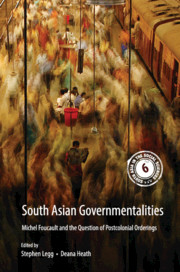Book contents
- Frontmatter
- Contents
- Acknowledgements
- Introductions
- Histories and Presents
- 3 Pastoral Care, the Reconstitution of Pastoral Power and the Creation of Disobedient Subjects under Colonialism
- 4 The Abiding Binary: The Social and the Political in Modern India
- 5 Colonial and Nationalist Truth Regimes: Empire, Europe and the Latter Foucault
- 6 Law as Economy/Economy as Governmentality: Convention, Corporation, Currency
- Subjects and Matters
- Reflection
- Contributors
- Index
4 - The Abiding Binary: The Social and the Political in Modern India
from Histories and Presents
Published online by Cambridge University Press: 28 October 2018
- Frontmatter
- Contents
- Acknowledgements
- Introductions
- Histories and Presents
- 3 Pastoral Care, the Reconstitution of Pastoral Power and the Creation of Disobedient Subjects under Colonialism
- 4 The Abiding Binary: The Social and the Political in Modern India
- 5 Colonial and Nationalist Truth Regimes: Empire, Europe and the Latter Foucault
- 6 Law as Economy/Economy as Governmentality: Convention, Corporation, Currency
- Subjects and Matters
- Reflection
- Contributors
- Index
Summary
The concept of governmentality has been crucial to the study of modern Indian history. Scholars have shown how colonial governmental techniques – reform, education, medicine, enumeration, classification, codification, survey and representation – came to produce in India critical social categories such as caste, religion, gender and ethnicity (Dirks, 2001; Hodges, 2004; Kalpagam, 2014; Stoler, 1995). Scholars have also discussed the continuities and discontinuities between colonial and postcolonial governmentality in order to specify the precise nature of the modern Indian state (Legg, 2006). Partha Chatterjee has gone further and described the postcolonial social as society of the ‘governed’ (as opposed to ‘citizens’) – the governed here being not just a policy category but also a political subjectivity, demanding ethico–poitical (though not juridico–civic) recognition (Chatterjee, 2004; Nigam, 2008). This chapter, pleads for a rethinking of the concept of governmentality, from a perspective, not merely of colonial difference but of historical difference in a wider sense. It proposes that the concept of governmentality, produced out of Foucault's re-reading of European history, is not applicable in the same way to all histories of the world. This is not to say that governmentality must be abandoned as a concept but only that the concept needs to be supplemented by other narratives and other concepts if it has to work transhistorically.
I shall make three basic arguments in this chapter. Firstly, I shall argue that modernity is not necessarily and not everywhere marked by a transition from sovereignty to governmentality. I am not merely referring to the fact of colonialism, which is nothing if not a routine (contra exceptional) mode of exercising violent sovereign power (Kolsky, 2010). I am also suggesting that sovereignty, as familiar to us from European histories of divine kingship and absolutist state, did not exist in the same form in precolonial India. This makes the narrative of political modernity quite different here. Secondly and consequently, I shall argue that in Indian history, the state/society or more broadly the social/political relationship is very differently configured. If governmentality is a form of ‘rule by/of the social’ – as opposed to sovereign rule from above and outside society – then to say that Indian history exhibits a different dynamic between the social and the political is to also invite a rethinking of governmentality as a concept.
- Type
- Chapter
- Information
- South Asian GovernmentalitiesMichel Foucault and the Question of Postcolonial Orderings, pp. 81 - 105Publisher: Cambridge University PressPrint publication year: 2018
- 12
- Cited by



